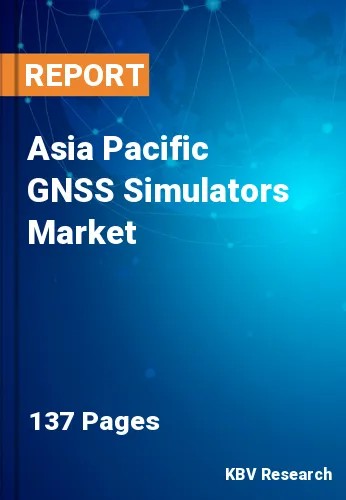The Asia Pacific GNSS Simulators Market would witness market growth of 10.1% CAGR during the forecast period (2022-2028).
Space Based Augmentation Systems (SBAS) are usually intended to increase the integrity and accuracy of the GPS /GNSS system for aircraft navigation and landing, in particular. SBAS satellites provide correction signals back to Earth, where SBAS corrections and integrity information are used to enhance accuracy and integrity by SBAS-enabled receivers. The transmission of corrective signals via ground-based equipment is an alternative to space-based augmentation.
Limited Area Augmentation Systems (LAAS) is an example of a system that enables a receiver to extract increased accuracy and integrity data in a local area, such as an airport where severe standards must be satisfied to land a commercial aircraft. GSS4150, Spirent's unique LAAS VHF data broadcast signal simulator, may be used to test LAAS. A portion of a satellite's transmission comprises its exact orbital data. Initially, the US Naval Observatory (USNO) regularly watched these satellites' exact orbits.
As a satellite's orbit varied, the USNO transmitted the satellite new information. Subsequent transmissions from a modernized satellite would provide its most current ephemeris. The systems of today are more straightforward. The satellite transmits a signal including orbital data and the precise time at which the signal was transmitted. Orbital data contain a broad almanac for locating all satellites and a precise ephemeris for this particular satellite.
The orbital ephemeris is delivered within a data message that is overlaid atop a timing reference code. The spacecraft employs an atomic clock to keep all satellites in the constellation synchronized. The receiver measures the time of flight to each satellite by comparing the time of broadcast included in the transmission of three distinct satellites.
It is anticipated that China's Beidou satellite navigation system would provide coverage by 2020, with location accuracies of fewer than ten meters (or one meter with regional augmentation) utilizing a network of 35 satellites. China has sought to field its satellite navigation system to address national security standards by closing military reliance on GPS, building a commercial downstream satellite navigation industry to capitalize on the rapidly expanding market; and achieving a domestic and international reputation by fielding one of only four navigation satellites.
The China market dominated the Asia Pacific GNSS Simulators Market by Country in 2021; thereby, achieving a market value of $26.0 million by 2028. The Japan market is registering a CAGR of 9.4% during (2022 - 2028). Additionally, The India market would showcase a CAGR of 10.8% during (2022 - 2028).
Based on Receiver, the market is segmented into GPS, Galileo, GLONASS, BeiDou, and Others. Based on Application, the market is segmented into Navigation & Mapping, Surveying, Location-based Services, Vehicle Assistance System, and Others. Based on Component, the market is segmented into Hardware, Software, and Services (Professional Services and Managed Services). Based on Vertical, the market is segmented into Military & Defense, Consumer Electronics, Automotive, Marine, Aerospace, and Others. Based on countries, the market is segmented into China, Japan, India, South Korea, Singapore, Malaysia, and Rest of Asia Pacific.
Free Valuable Insights: The Worldwide GNSS Simulators Market is Projected to reach USD 310.8 Million by 2028, at a CAGR of 9.2%
The market research report covers the analysis of key stake holders of the market. Key companies profiled in the report include Spirent Communications plc, Keysight Technologies, Inc., Viavi Solutions, Inc., Hexagon AB, U-blox Holding AG, Rohde & Schwarz GmbH & Co. KG, Syntony GNSS, RACELOGIC Ltd., Averna Technologies, Inc. and Accord Software & Systems Private Limited.
By Type
By Receiver
By Application
By Component
By Vertical
By Country
Our team of dedicated experts can provide you with attractive expansion opportunities for your business.

